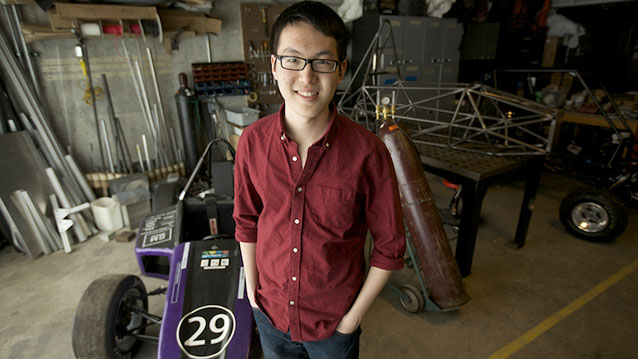EVANSTON, Ill. --- Northwestern University senior Edward Pang, driven by a devotion to sustainability, has received a Churchill Scholarship from the Winston Churchill Foundation to pursue graduate studies at the University of Cambridge.
Pang has had a lifelong infatuation with airplanes and is excited by the prospect of working to improve the energy efficiency of future aircraft through innovative new materials.
“I’m still a little in shock, but I’m really excited -- what a wonderful opportunity,” said Pang, a materials science and engineering student in the McCormick School of Engineering and Applied Science and a native of Copley, Ohio.
“The opportunities I’ve had at Northwestern really helped make this happen,” Pang said. “I’ve worked with some amazing faculty members, such as Peter Voorhees and David Dunand, who allowed me to work in their labs and also helped me make important connections, such as with NASA. Outside of coursework, hands-on experience, both in the research lab and with the Northwestern Formula Racing team, has been the most important thing I’ve gained at Northwestern.”
Pang has an exceptional understanding of materials science, both computationally and experimentally, his professors say, and already is contributing to the development of cutting-edge materials to accommodate more energy-efficient technologies. He focuses upon alloys, materials composed of two or more metals or a metal and a nonmetal.
“My goal is to create a more sustainable world using materials,” Pang said. “Right now we are currently on a course that’s unsustainable, I’d say, just from the world’s growing energy needs and the amount of carbon emitted into the atmosphere. My work in materials aims to make technologies more efficient, so we can prevent irreversible climate change and maintain energy availability for the growing population.”
The eighth Churchill Scholar from Northwestern since 2003, Pang was selected from among 90 nominees nationwide for the 14 scholarships awarded this year. The foundation’s competitive scholarship program offers American citizens of exceptional ability and outstanding achievement the opportunity to pursue graduate studies in engineering, mathematics or the sciences at Cambridge.
Pang, who plans to become a materials science professor, will be based in the materials science and metallurgy department at Cambridge, working toward a research-based Master of Philosophy degree. He will focus upon a new family of titanium-based shape-memory alloys, which promise substantial efficiency improvements in gas turbine engines, such as those used in aircraft and power generators. The Churchill Scholarship provides one year of support, including all tuition and fees, airfare and a living allowance.
The McCormick faculty members who know Pang well are impressed with the academic and research prowess Pang shows at such a young age, as well as with his poise.
“Edward is an articulate and brilliant student,” said Voorhees, the Frank C. Engelhart Professor of Materials Science and Engineering and Pang’s academic advisor since Pang was a freshman. “He is the best student I have had in my undergraduate classes in the last decade and is one of the two most productive undergraduate researchers I’ve worked with in my 30-year career.
“Edward interacts extremely well with colleagues, is self-confident and curious, and has the drive and wide-ranging intellect to take on new challenges. He will be an outstanding graduate student and a marvelous ambassador,” Voorhees said.
Since arriving at Northwestern, Pang has worked on developing innovative materials as a member of the research groups of Voorhees and Dunand; as a summer materials research intern with NASA on an International Space Station project; and as an intern with NanoAl LLC, a start-up company founded by Dunand, McCormick colleague Professor David Seidman and their postdoctoral fellow Nhon Vo.
Pang also is the co-author of two upcoming research papers, both on work conducted with Voorhees.
“Edward has proven himself to be a self-starter and highly motivated student who can excel in a fast-paced research environment,” said Dunand, the James N. and Margie M. Krebs Professor of Materials Science and Engineering at McCormick.
“He always wants to know why things happen, which bodes extremely well for his success as a graduate student,” said Dunand, also co-director of the Institute for Sustainability and Energy at Northwestern (ISEN). “I am impressed with the depth and breadth of his research plan for Cambridge -- designing a new shape-memory material that could improve fuel efficiency in gas turbine engines, with potential global impact in the areas of energy and sustainability.”
A builder and tinkerer since childhood as well as an accomplished musician, Pang has been a member of the Northwestern Formula Racing team, a clarinetist with the Northwestern University Concert Band and a work-study employee at the Pick-Staiger Concert Hall box office for all four of his years at the University. He also relishes his experiences mentoring college and high school students through the organizations Gateway Science Workshop and Strive for College.
Established in 1959, the Winston Churchill Foundation was founded by American friends of Churchill who wanted to fulfill his wish of always having young American graduate students at Churchill College at the University of Cambridge.
Eligible universities, consisting of the top schools in the nation, are allowed to nominate only two qualified applicants for the Churchill Scholarship. Nominees must display high academic achievement and the capacity to contribute to the advancement of knowledge in their field.
Churchill College was built in tribute to Winston Churchill, who in the years after the Second World War recognized the growing importance of science and technology for prosperity and security. Churchill College focuses upon the sciences, engineering and mathematics.
For more information on fellowship opportunities, contact Sara Anson Vaux, director of the Northwestern University Office of Fellowships, at 847-491-2617 or scv@northwestern.edu.


